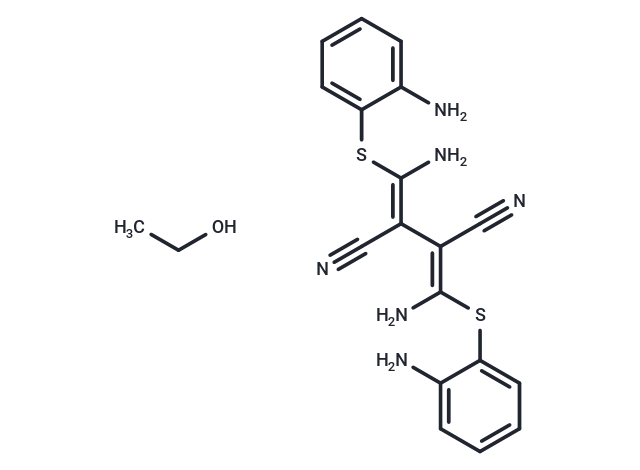购物车
- 全部删除
 您的购物车当前为空
您的购物车当前为空

U0126-EtOH (U0126 Ethanol) 是一种非 ATP 竞争性的选择性MEK1和MEK2抑制剂,IC50分别为 72 nM 和 58 nM。U0126-EtOH 可抑制自噬和线粒体自噬。

U0126-EtOH (U0126 Ethanol) 是一种非 ATP 竞争性的选择性MEK1和MEK2抑制剂,IC50分别为 72 nM 和 58 nM。U0126-EtOH 可抑制自噬和线粒体自噬。
| 规格 | 价格 | 库存 | 数量 |
|---|---|---|---|
| 1 mg | ¥ 167 | 现货 | |
| 5 mg | ¥ 383 | 现货 | |
| 10 mg | ¥ 617 | 现货 | |
| 25 mg | ¥ 995 | 现货 | |
| 50 mg | ¥ 1,730 | 现货 | |
| 100 mg | ¥ 2,860 | 现货 | |
| 200 mg | ¥ 4,180 | 现货 | |
| 500 mg | ¥ 6,570 | 现货 | |
| 1 mL x 10 mM (in DMSO) | ¥ 417 | 现货 |
| 产品描述 | U0126-EtOH (U0126 Ethanol) is a non-ATP competitive specific inhibitor of MEK1/2 (IC50: 0.07/0.06 μM). |
| 靶点活性 | MEK2:60 nM (cell free), MEK1:70 nM (cell free) |
| 体外活性 | U0126通过非竞争性抑制具有双特异性的激酶MEK的活性,从而抵抗AP-1转录活性,其IC50分别对MEK 1为0.07 microM,对MEK 2为0.06 microM [1]。在用TPA/血清处理的成纤维细胞中,U0126可以降低c-Fos和c-Jun蛋白的上调50-80%。使用10 μM U0126处理不会影响SP-1、JunD及Fra-1等本质上表达的转录因子的蛋白水平[2]。在HEK293细胞中,U0126导致AMPK的磷酸化和激活,并增加了其下游靶标乙酰-CoA羧化酶的磷酸化,这一效应仅在表达上游激酶LKB1的细胞中发生[3]。 |
| 体内活性 | 将小鼠通过气雾剂途径处理U0126,导致了以下结果:(i) 抑制了肺部MEK激活 (ii) 相比未经处理的对照组,减少了后代IAV滴度 (iii) 保护了IAV感染的小鼠,对抗100倍致死性病毒挑战[4]。在所有U0126 (10.5 mg/kg) 实验中,移植和早期肿瘤生长显著减少。此外,在注射后第9天及以后,用U0126处理的肿瘤体积减少了60-70%。U0126处理的小鼠中Cdk1表达也大幅降低[5]。 |
| 激酶实验 | The amount of immunoprecipitated wild type MEK used in these assays was adjusted to give a similar amount of activity units as obtained with 10 nM recombinant MEK. All other assays were performed with a recombinant, constitutively activated mutant MEK-1 (ΔN3-S218E/S222D) or constitutively active MEK-2(S222E/S226D). Reaction velocities were measured using a 96-well nitrocellulose filter apparatus as described below. Unless otherwise noted, reactions were carried out at an enzyme concentration of 10 nM, in 20 mM Hepes, 10 mM MgCl2, 5 mM β-mercaptoethanol, 0.1 mg/ml BSA, pH 7.4, at room temperature. Reactions were initiated by the addition of [γ-33P]ATP into the premixed MEK/ERK/inhibitor reaction mixture, and an aliquot of 100 μl was taken every 6 min and transferred to the 96-well nitrocellulose membrane plate which had 50 mM EDTA to stop the reaction. The membrane plate was drawn and washed 4 times with buffer under vacuum. Wells were then filled with 30 μl of Microscint-20 scintillation fluid, and the radioactivity of33P-phosphorylated ERK was counted with a Top Count scintillation counter. Velocities were obtained from the slopes of radioactivity versus time plots. Concentrations of ERK and ATP were 400 nM and 40 μM, respectively, unless otherwise indicated [2]. |
| 细胞实验 | HEK293 cells were maintained in Dulbecco's modification of Eagle's medium (low glucose) plus 10% foetal bovine serum. HeLa cells stably expressing wild type or kinase-dead LKB1 have been described. AMPK activity was determined by immunoprecipitate kinase assays using anti-AMPK-a1 and -a2 antibodies. Antibodies recognising AMPK phosphorylated on Thr-172 (anti-pT172), AMPK-α1 and -α2 and acetyl-CoA carboxylase-1 (ACC1) phosphorylated on Ser-80 [16] were described previously. Quantification of ratios of signals from phosphorylated and total protein using these antibodies was performed by dual labelling using the LI-COR Odyssey IR imager as described. Contents of ATP and ADP were determined for cells in 6 cm culture dishes by quickly pouring off the medium, adding 350 μl of ice-cold 5% perchloric acid, scraping the cells off with a plastic scraper, and centrifuging (14 000 · g; 3 min, 4 °C) to remove insoluble material. The perchloric acid was then extracted from the supernatant and nucleotides analysed by capillary electrophoresis of perchloric acid extracts as described previously. All incubations of cells were performed in triplicate and results are expressed as means ± S.E.M [3]. |
| 动物实验 | Prior to injection, FI cells were labeled with a stable fluorescent dye molecule, DiA at 10 μg/ml for 5 h at 37 1C. After washing to remove free DiA, cells were trypsinized for inoculation (U0126 experiments) or transfection (RNAi experiments). Biliary epithelial cells were injected subcutaneously, at the indicated times, into the tibia of nude mice. In the chemical experiments, 3h after inoculation, mice were treated with U0126 (10.5 mg/kg) daily by intraperitoneal injection. The length and width of each tumor were measured every day by using a caliper. The following formula was used to calculate tumor volumes ? width2 length/2. Mice were killed at the end of experiment. Tumors were immediately frozen in liquid nitrogen [5]. |
| 别名 | U0126 Ethanol, U0126 |
| 分子量 | 426.6 |
| 分子式 | C18H16N6S2·C2H6O |
| CAS No. | 1173097-76-1 |
| Smiles | CCO.N\C(Sc1ccccc1N)=C(\C#N)/C(/C#N)=C(\N)Sc1ccccc1N |
| 密度 | no data available |
| 存储 | Powder: -20°C for 3 years | In solvent: -80°C for 1 year | Shipping with blue ice. | |||||||||||||||||||||||||||||||||||
| 溶解度信息 | Ethanol: < 1 mg/mL (insoluble or slightly soluble) DMSO: 55 mg/mL (128.93 mM), Sonication is recommended. | |||||||||||||||||||||||||||||||||||
| 体内实验配方 | 10% DMSO+40% PEG300+5% Tween 80+45% Saline: 7.9 mg/mL (18.52 mM), In vivo: Please add the solvents sequentially, clarifying the solution as much as possible before adding the next one. Dissolve by heating and/or sonication if necessary. Working solution is recommended to be prepared and used immediately. 请按顺序添加溶剂,在添加下一种溶剂之前,尽可能使溶液澄清。如有必要,可通过加热、超声、涡旋处理进行溶解。工作液建议现配现用。以上配方仅供参考,体内配方并不是绝对的,请根据不同情况进行调整。 | |||||||||||||||||||||||||||||||||||
溶液配制表 | ||||||||||||||||||||||||||||||||||||
DMSO
| ||||||||||||||||||||||||||||||||||||
评论内容